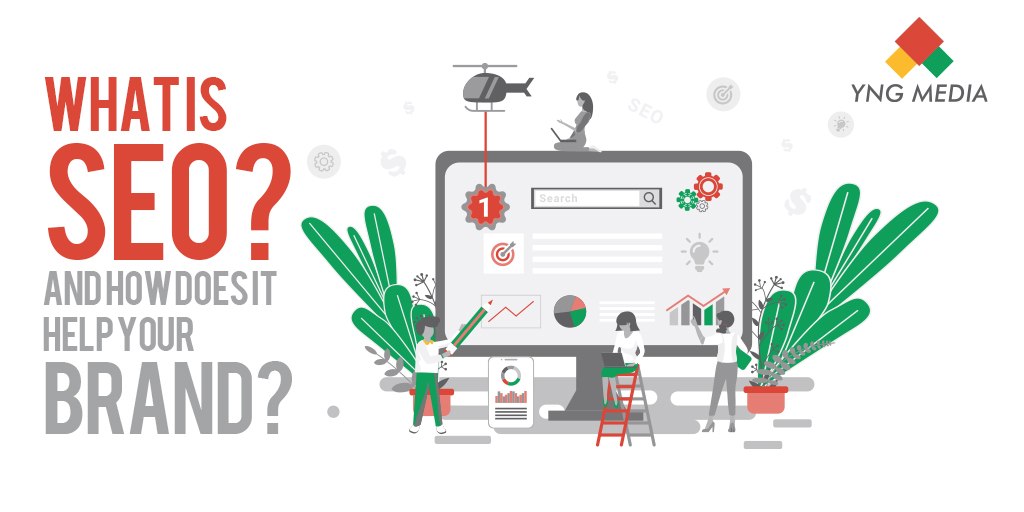

Search engine optimization (SEO) refers to techniques that help your website rank higher in organic (or “natural”) search results, thus making your website more visible to people who are looking for your product or service via search engines. SEO is part of the broader topic of Search Engine Marketing (SEM), a term used to describe all marketing strategies for search. SEM entails both organic and paid search. With paid search, you can pay to list your website on a search engine so that your website shows up when someone types in a specific keyword or phrase. Organic and paid listings both appear on the search engine, but they are displayed in different locations on the page.
How do search engines work?
Let’s go step by step into search engines to understand how any search engine work.
Crawling – Web crawling is the process by which we gather pages from the Web, in order to index them and support a search engine. The objective of crawling is to quickly and efficiently gather as many useful web pages as possible, together with the link structure that interconnects them.
Indexing – The process of creating an index for all the fetched web pages and keeping them in a giant database from where it can be retrieved later. Indexing is identifying the words and expressions that best describe the page and assigning that page to particular keywords.
Processing – After receiving a search request, the search engine compares the search string in the search request with the database indexed pages.
Ranking – Google uses over 200 factors to decide what order to display the matching pages. Each matching page is scored for each of the 200-plus factors and the scores totaled. The total score is then used to rank the matching pages and decide the order the results are presented on the search results page (highest at the top).
Retrieving Results – At last, the best-matched results will be retrieved, which is nothing but simply displaying them in the browser.
On the page
How often the keyword is used on the page?
Do the keywords appear in the page title and the URL?
Does the page include synonyms (words that have a similar meaning) for the keyword?
On-page SEO efforts are geared at the “crawl-ability” and usability of the pages on your website. They involve the parts of your website that get seen by the public and get read by search engines. On-page SEO has to do with:
• Page Content: Its relevance to the keywords it’s targeting, the quality of the content, its usefulness to users.
• Page Experience: How engaging is the page, does it get readers to stay and click to other pages, is it intuitive?
• Page Structure: Title tags, headers, image tags, meta descriptions are all complete and contain keywords you are targeting.
On the site
Is the page from a high-quality website, or is it low quality or spam ?
How many links from other pages and sites point to the page (and how important are those links)?
The use of the search query (keywords) in the anchor text of any links pointing to a page.
User Behavior
The percentage of searchers that click-through (click-through rate – CTR) to each listed page.
The percentage of searchers that, once they have clicked through to a page, come straight back to the search results.
Social reference
How much (and by whom) a page is referenced on social sites like Facebook, Twitter and Google+
Whether or not others in a searcher’s social network have shown a preference for a page (giving personalized results).
Local – The location of both the searcher, the web page and its business if it’s deemed the search query deserves a local result.
How SEO helps your brand?
1. SEO is Good for Business Visibility and Branding– Visibility plays a key role to make your brand popular. Presenting your business in the top search engine results will gain a large number of visitors, which in turn enhances your Brand awareness. Ranking higher for multiple keywords plays a major role in brand awareness.
2. SEO Provides Your Business Credibility – With the increase in mobile and computer use, people are relying more and more on search engines. People trust that the first results in Google are from reputable companies. So, by doing SEO your website can become a more trusted brand name.
3. SEO Brings Your Business Traffic – Once your website ranking increases, there is a higher chance of more traffic being diverted to your web pages. This can be precious to a new start-up or blog looking to establish in the present market trend.
4. SEO Has One of the Best ROI’s in Advertising – SEO is one of the most cost-effective marketing strategies because it targets users who are actively looking for your products and services online. At the same time, organic listings are essentially free. When you are listed at the top, you don’t need to pay per click or allocate a budget for advertising, one of the main benefits of SEO is that once it is set up properly, it keeps on attracting new prospects without any additional cost.
5. SEO Gives You Unmatched Insight into Your Customers – If your website is properly optimized, it will increase your search engine visibility, usability, and credibility, all of which increase traffic to your site. Now that you are enjoying higher numbers of visitors, Google Analytics (which every website should have set up) can track valuable information about your visitors. Find out what browser they use, keywords, the technology, their geographical location, the days and times they are most active, how much time they spent on a page…on and on.
Also Read : 10 SEO Trends in 2020
Best Digital Marketing Tools in 2020